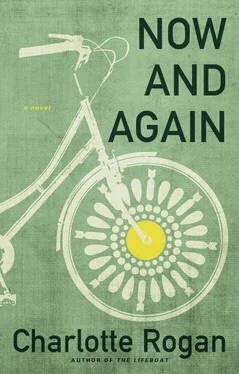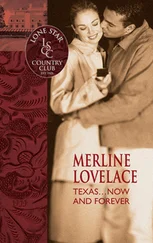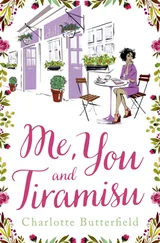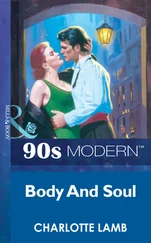“How’s Will?” was the first thing Maggie always asked when Lyle called. Then Lyle would tell her the local gossip and Maggie would tell him about her work. “That series of articles about innocent prisoners has sparked new interest in Tomás’s case,” she said now. “Did they ever figure out I’m the one who took his records?”
“Nothing official,” said Lyle, which was true as far as it went. He didn’t say anything about what everyone suspected.
“And how are you doing, honeybun?” was the last thing Maggie always asked before hanging up. Lyle would reply, “I can’t complain,” the way he always replied when anyone asked him how he was. If he had had a life philosophy, it would have involved not complaining and blending in.
9.7 Dolly
Dolly had always thought that something astonishing was going to happen to her, something to erase the ordinariness of her life — something, rather, that was the reason for the ordinariness, so that when the time came, she would be free to devote her whole attention to whatever it was. Instead of sitting back and waiting for the thing to happen, she believed in helping the gods or fate or whatever forces were in control of her destiny, so just before Danny came home, she had fixed up the apartment. After that, every time she walked in the door, it was as if she had spent a weekend away and come home unsuspecting, the way it happened on Extreme Makeover: Home Edition. And when she looked up one day and saw that the clinic waiting area had undergone a similar transformation, she was as surprised as anyone, even though she herself had done the painting and even though she had scoured the classified ads for secondhand furniture and taken on some hours at the hospital to pay the cost.
For the walls, she had chosen a color called Quiet Moments 1563. Against it, even the folding metal chairs looked inviting. She had hung sheer panels at the windows and put a rustic table and mismatched armchairs in the center of the room. “Shabby chic,” she said when the doctor cocked his eyebrows at her. But she was proud of her work.
“Decorating on a budget takes far more skill than your high-dollar projects,” one of her regular patients told her. Another said Dolly definitely had an eye. Someday she’d do the geraniums and the parking lot, but someday had always included Danny, and Dolly didn’t know what she was supposed to think about someday now that Danny had gone off with the members of his old unit.
“How’s that soldier of yours doing?” asked the doctor one afternoon when Dolly went in to give him his mail.
When Dolly blinked at him in astonishment, he said, “I keep my ears open. I know a thing or two about what’s going on.”
“He’s in New Jersey,” said Dolly. “He and some friends are starting something there.”
The doctor no longer seemed to be listening, but then he said, “I thought you’d be interested to hear that I’ve gotten involved in a study run by some people at the university. Don’t you go telling anyone about it yet — no sense drawing fire before we’re ready — but I thought you’d want to know.” He smiled kindly, which made Dolly want to weep. It made her want to throw her arms around his stooped shoulders and confide all of her worries in him. She wanted to say that she hadn’t told Danny about the tadpole because things were better with him gone, but she didn’t want to burden the doctor with her own troubles when he had troubles of his own. Instead, she wiped her hand across her eyes and said, “This was a good day!”
And it had been a good day, because all of the appointments had gone smoothly, and because no one had thrown a fit or yelled at her, and because that day all of the husbands and boyfriends had spoken softly to the women and held their hands.
Why wasn’t Danny there to hold Dolly’s hand? Because Danny was better off with his comrades. He was better off making critical information available to the public than sitting around in the fixed-up apartment with nothing important to do. And, frankly, she was better off too. It was a relief that he was no longer jumping at noises or straightening the silverware or smoothing the coverlet on the bed or roughing it up again to test how much disorder he could stand. The problem was that now she was doing it. Now she was lining up the pencils on the desk and making sure the folding chairs were evenly spaced against the wall and organizing the magazines into separate piles: Better Homes and Gardens next to Family Circle, Oprah and People next to Shape, Road & Track off in a corner by itself.
The week before, a handsome but careless driver had dented Dolly’s fender and sent her a check for the damage along with a bouquet of flowers. Then, when she called to thank him, he had asked her on a proper date of the kind Danny seemed to have forgotten about. Now she wondered if the tapestry of her life was the same as Danny’s tapestry or if it was just hanging next to it. “Rain check?” the careless driver had asked, and Dolly hadn’t answered yes or no. Whenever she was in a quandary, she liked to open the Bible and point to a passage at random. The last time she tried it, she had pointed to a depressing verse about the land of gloom and chaos. Now she thought of seeking guidance again, but instead of getting the Bible out of her desk drawer, she closed her eyes and picked up a magazine from the table in front of her — who was more likely to give her good advice, Job or Oprah? When she opened her eyes, she was looking at a headline that said: IS YOUR HANDBAG KILLING YOU?
She tried the November issue: COULD A MAN DRIVE YOU CRAZY? seemed pertinent. October: DO WHAT YOU LOVE! Then she opened Road & Track: My attitude changed within about five minutes behind the wheel of the Azera. From People magazine: After 23 days behind bars, the heiress took back her freedom in a Petro Zillia blazer and jeans from her very own denim line. From a book someone had left on the table: So it goes.
Out in the driveway, a car door slammed. It was a late patient, rushing to make the five o’clock closing. Dolly could see her hurrying through the mud with her scarf flapping in the wind and her arms around an unwieldy cardboard box. She hoped there wasn’t a stillborn baby in the box because so far, it had been an almost perfect day. “Do we have time for one more?” she asked the doctor.
“If you’re quick about it. It’s nearly five, and I have dinner plans.”
The young woman who entered the waiting room stood in the doorway, her scarf pulled up to her chin and her hood pulled down over her ears. She was shuffling her feet in a way that Dolly knew from long experience irritated the doctor. Before he could bark out that he was a busy man, Dolly said, “Please tell the doctor what you’ve come to see him about.”
The woman glanced nervously from the doctor to Dolly and back again. It was only when she set the box down on the rustic table and took off her jacket and unwound her scarf that Dolly recognized Tula. “Tula!” she cried. “I haven’t seen you in months! Are you all right? Are you here to see the doctor? I hope something isn’t wrong!”
“No,” said Tula. “I’m here to see you. There’s something in this box that I think you’ll want to see.”
9.8 Maggie
Just before Christmas, a FOR SALE sign went up in front of the church, and soon afterward, Maggie returned to find a group of real estate agents inspecting the garden. She lingered on the sidewalk and tried to figure out what they were talking about, but she only caught snatches of their conversation: “nonessential properties,” “abuse scandal,” “not remotely worth what they’re asking.”
Читать дальше












